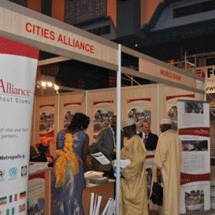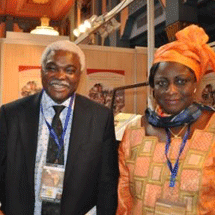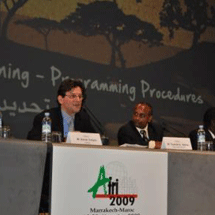Cities Alliance’s support to local governments all over the world and particularly in Africa was warmly recognised by a gathering of local governments at the just concluded 5th Africities Summit in Marrakech, Morocco.
The surprise award cited as “Tools and Methods of Support to Local Governments” was one of the highlights of the Alliance’s participation at a successful Summit, which was held from 16 to 20 December 2009.

Close to 4,000 delegates attended the meeting, representing the wide gamut of local government officials from forty seven countries of Africa, including 32 ministers, their development counterparts including representation from organisations like the World Bank, UN-HABITAT, WHO, GTZ, AFD, in addition to national and regional organisations, civil society representatives, and private sector institutions.
In his message to the Summit King Mohammed VI of Morocco spoke of his country’s “pride in hosting this major African event, consistent with my country’s strong sense of belonging to an African family but also in keeping with its firm commitment to the just causes of African peoples and their right to unity and solidarity.”
He spoke also of his firm belief in the “pivotal role of local governments: “They play a particularly important part in the objective we all with to achieve, namely a dignified life for all our citizens, economic and social progress for our countries, African unity and a higher understanding for our continent on the world stage, as well as greater South-South cooperation.”
The Opening plenary of the Summit was addressed by His Excellency Jerry Rawlings, Former President of Ghana. He gave a keynote address titled, “The Global Crises, An African Perspective”, where he argued for more “decentralization” and less “corruption” in African governments:
''Decentralization and empowering of people puts us as leaders in a position of owing accountability to the people as opposed to demanding accountability from them. Local government today has the potential to deliver on development that satisfies the basic needs and human rights of the people of the developing world, thereby helping to confront the globalization crisis. It has the potential to contribute to the prevention of conflicts related to the demands for good and participatory governance. Decentralization, if well implemented serves as a foundation for regionalization. Regionalization as we are all aware allows us benefits of economies of scale, stronger bargaining power and the tapping of resources of member states for the benefit of the entire grouping.''

Cities Alliance’ session on “Defining Planning Programming Processes” hosted in collaboration with ISTED was one of the best attended events at the Summit, and topic of numerous follow up conversations and meetings held at the booth.
Close to seven different mayors—including from cities and towns as varied as Ouagadougou, Dakar, Abomey-Calavi and Agadir—spoke on their various experiences of strategic urban planning in a well attended session moderated by both Tewodros Tigabu, Cities Alliance’s regional advisor for East and Central Africa and Xavier Crepin, Executive Director of ISTED.

Among other benefits to local governments planning enables prioritisation of interventions, that take into account availability of resources, leading to a more rational distribution of these to ensure local growth and sustainable reduction of poverty. Adoption of a planning culture does however come up against the limits imposed by the duration of electoral mandates, a major source of concern for the participants. Planning was identified as a long term venture (between 10 and 20 years) while programming was medium terms (between three and five years).
Cities Alliance Senior Urban Finance Specialist, Thierry Paulais presented another Africities specific paper titled “Local Governments and the Financial Crisis: An Analysis” at both a plenary session and a thematic session on renewing local governance and management sponsored by Agence Française de Développement (AFD).
The Africities 5 Summit ended in Marrakech on Sunday December 20th with a call by the participants for a collective effort to “tackle the continent's major challenges, such as debt, poverty and global warming.” In his closing remarks Moroccan Interior Minister, Chakib Benmoussa underlined Morocco's policy of working alongside local authorities to encourage development by helping them mobilise financial and human resources and set up sectoral programmes to strengthen their infrastructure.

The minister said he hoped the conference would lead to a common approach among African local authorities to cope with the international crisis and proposed the creation of a fund to finance their projects.
In his final remarks to close the Summit, Jean-Pierre Elong Mbassi prime mover of the Africities Summits and Secretary-General of Africa’s United Cities and Local Governments (UCLGA) announced that the next Africities Summit will be hosted by the Senegalese capital, Dakar in early December 2012, to loud cheers from the sizable Senegalese delegation to the Summit.




